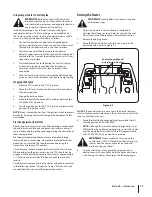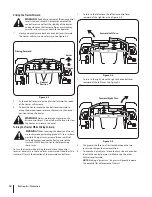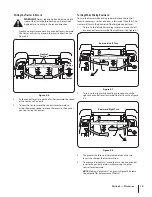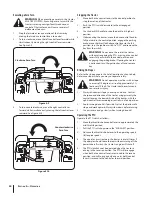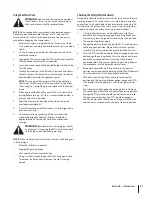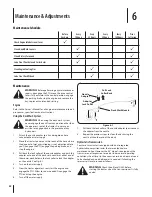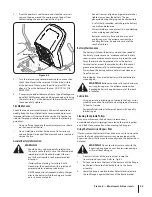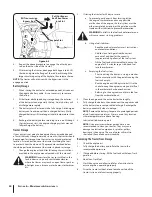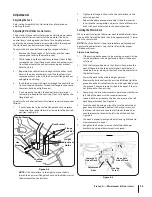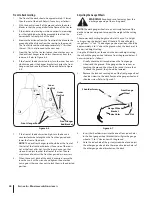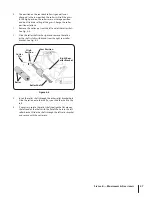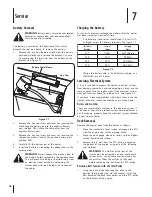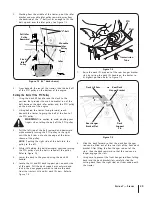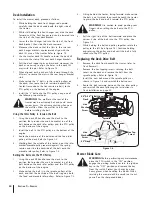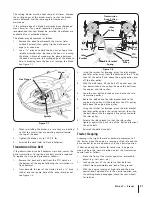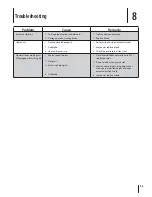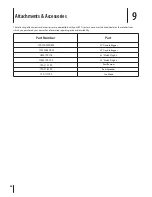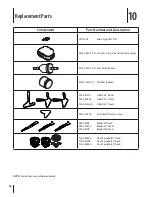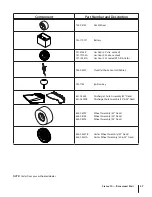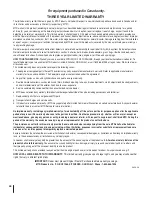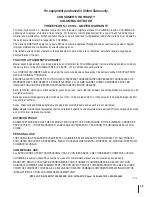
Repeat the above procedure to engage the other bypass
4.
rod on the other side of the tractor.
After moving the tractor, disengage both bypass rods. Lift
5.
the rod and guide the flange of the rod back through the
larger circular opening of the keyhole, then release the rod.
NOTE:
The tractor will not drive with the bypass rods in the
engage position.
Battery Storage
When storing the tractor for extended periods, disconnect
1.
the negative battery cable. It is not necessary to remove
the battery.
All batteries discharge during storage. Keep the exterior
2.
of the battery clean, especially the top. A dirty battery will
discharge more rapidly.
The battery must be stored with a full charge. A discharged
3.
battery can freeze sooner than a charged battery. A fully
charged battery will store longer in cold temperatures than
hot.
Recharge the battery before returning to service. Although
4.
the tractor may start, the engine charging system may not
fully recharge the battery.
Tractor Storage
If your tractor is not going to be operated for an extended period
of time (thirty days to approximately six months), the tractor should
be prepared for storage. Store the tractor in a dry and protected
location. If stored outside, cover the tractor (including the tires)
to protect it from the elements. The procedures outlined below
should be performed whenever the tractor is placed in storage.
Change the engine oil and filter following the instructions
1.
provided in the engine manual packed with this manual.
8"3/*/(
Never store the tractor with fuel in the
tank indoors or in poorly ventilated enclosures,
where fuel fumes may reach an open flame, spark or
pilot light as on a furnace, water heater, clothes dryer,
etc.
If storing the tractor for 30 days or more:
2.
To prevent gum deposits from forming inside
a.
the engine’s carburetor and causing possible
malfunction of the engine, the fuel system must be
either completely emptied, or the gasoline must be
treated with a stabilizer to prevent deterioration.
8"3/*/(
Fuel left in the fuel tank deteriorates and
will cause serious starting problems.
Using a fuel stabilizer:
b.
Read the product manufacturer’s instructions
t
and recommendations.
Add to clean, fresh gasoline the correct
t
amount of stabilizer for the capacity
(approximately 3 gallons) of the fuel system.
Fill the fuel tank with treated fuel and run the
t
engine for 2-3 minutes to get stabilized fuel
into the carburetor.
Emptying the fuel system:
c.
Prior to putting the tractor in storage, monitor
t
fuel consumption with the goal of running the
fuel tank empty.
Run the engine until it begins to stall. Use the
t
choke to keep the engine running until all fuel
in the carburetor has been exhausted.
Referring to the engine manual, drain the fuel
t
from the carburetor bowl.
Clean the engine and the entire tractor thoroughly.
3.
Fully charge the battery, then disconnect the negative cable
4.
at the battery to prevent possible discharge. Recharge the
battery periodically when in storage.
NOTE:
Remove the battery if exposed to prolonged periods
of sub-freezing temperatures. Store in a cool, dry location
where temperatures are above freezing.
Lubricate all lubrication points.
5.
NOTE:
Use a pressure washer or garden hose is not
recommended to clean your tractor. They may cause
damage to electrical components, spindles, pulleys,
bearings or the engine. The use of water will result in
shortened life and reduce serviceability.
Removing The Tractor From Storage
Check the engine oil.
1.
Fully charge the battery and inflate the tires to the
2.
recommended pressure.
If drained before storing, fill the fuel tank with clean, fresh
3.
gasoline.
Add clean, fresh fuel.
4.
Start the engine and allow to idle for a few minutes to
5.
ensure engine is operating properly.
Drive the tractor without a load to make certain all the
6.
tractor systems are functioning properly.
1VMM0VU#ZQBTT
3PE5IFO-PXFS
*OUP4MPU
,FZIPMF4MPU
3)5SBOTNJTTJPO
#ZQBTT3PE
'JHVSF
S
ECTION
6— M
AINTENANCE
& A
DJUSTMENTS
Summary of Contents for ZT50
Page 35: ...Notes ...








